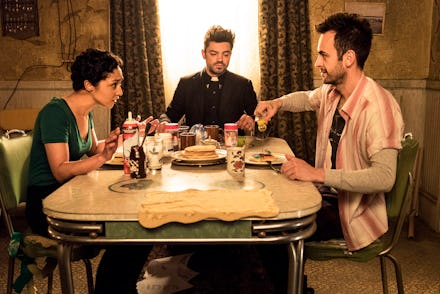AMC’s ‘Preacher’ is the most scathing satire of America you’re not watching

The cold open to the sixth episode of Preacher’s second season feels like it’s coming from a different show. An AMC show, to be sure, with the signature grimy cinematography and reddish hue, but it features none of the series’ primary cast members. Instead, a man in a suit is detailing the financial terms of a confidentiality clause for a “procedure.” A husband and wife look on, and the man explains that the more they’re allowed to take from the husband — upwards of 10% — the more money they’ll receive.
“As far as we can tell, based on the thousands of clinical trials, there aren’t any,” the man in a suit says, when asked about the long-term effects of the procedure.
The husband agrees to give up 15%; they’ll receive $150,000 in return, and the operation happens right there on the couch. It’s a lot like drawing blood, but as the viewer finds out, this isn’t some routine (albeit oddly expensive) blood drive. The husband is literally giving away part of his soul. This might seem preposterous on another show, but on Preacher — whose titular clergyman’s primary goal this season is to find God and, possibly, kick his ass for abandoning his flock — it’s just another week for the dark, irreverent and otherworldly series.
But Preacher is more than the sum of its strange gags — like our preacher Jesse Custer (Dominic Cooper) trying to find God at a bar in New Orleans and instead accidentally agreeing to a potential orgy with a latex-clad man-dog — and hectic fight sequences. At its freakish heart, the show is an often scathing satire of America — on class, capitalism and, of course, religion. (If you tried season one but gave up, please give season two a chance.)
The soul-stripping enterprise is one example of Preacher’s cynicism; it posits that if human beings figured out that souls existed and could be mined, of course someone would try to profit off it. In the second part of the cold open, we follow the man in the suit as he travels to a decadent mansion and visits an elderly couple. The wife has some form of dementia, and the husband is willing to pay more than $2 million for a cure, which happens to be injecting part of someone else’s soul into her if it’s a “match.”
It’s quite a profit for the businessman — pay $150,000 to a man giving away his soul, net over $2 million in return — who we later discover works for a Japanese company whose name translates to “Soul Happy Go Go.” Obviously, this capitalist venture largely benefits corporations and the wealthy elites (sound familiar?), who are the only ones that can afford what is, ostensibly, a miraculous cure-all for diseases. And alternatively, who would agree to literally sell off part of their soul for immediate profit? If the Soul Happy Go Go armored truck, which is filled to the brim with vials of fragmented souls, is any indication, it’s plenty of people.
This all ties back into Jesse’s story, when he, Tulip (Ruth Negga) and Cassidy (Joseph Gilgun) learn more about the mysterious Saint of Killers (Graham McTavish). The being spawned from hell, tasked with killing Jesse, is immune to Jesse’s godlike Genesis power, which allows him to command anyone to do his will. The reason the Saint of Killers’ is not affected? He doesn’t have a soul. The trio discover this when Tulip listens to an audiobook titled American Psychopaths. It’s a neat scene, interspersed with panels from the comics that feature the villain, in all his terrifying glory, slaughtering people. The fun kicker: The narrator tells Tulip to tune into the next chapter of the American Psychopaths series, which focuses on Dick Cheney.
To be clear, Preacher’s condemnation of all things Americana isn’t remotely self-serious. After all, two of the showrunners are Seth Rogen (yes, really) and Evan Goldberg. You can almost hear them giggling behind the camera, alongside fellow showrunner Sam Catlin. And when it’s not roasting American politics, Preacher encroaches on the bureaucracy of hell — with Hitler in tow.
Yes, there’s an entire subplot set in hell that features Hitler, played by Noah Taylor. Hell is currently facing a very American problem: It’s overcrowded, an apt parallel to the country’s prison system. The inhabitants are treated much the same way as prisoners, confined to life in a cell, reliving the worst memory of their lives in a repeated loop.
Ironically, we view hell through the lens of Eugene (Ian Colletti), arguably the only person on the show who shouldn’t be there; he was sent down through Jesse’s Genesis power in season one for scolding Jesse’s suggestion to command everyone to “see the light.”
It’s funny in the most morose way — that hell is sort of malfunctioning with the overcrowding issue, but also that there’s so many people who deserve to be there. If Eugene’s cell number, 3767211725, is any indication, there are nearly 4 billion people down there.
Yet back on Earth, Jesse bears little remorse for sending an innocent kid to hell; he even brags about it, at one point saying he’d be willing to do it again. That Jesse’s ultimate plan to stop the Saint of Killers is to inject a fraction of his soul into the villain, causing him to fall prey to Jesse’s Genesis powers, isn’t particularly surprising. Like Preacher’s version of America, Jesse’s soul is already rotting. What’s he really losing by giving up a piece of it?
Preacher season two airs Mondays at 9 p.m. Eastern on AMC.